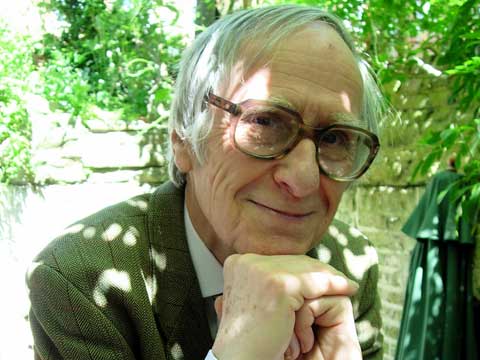Originally published in The Ecologist on the 21st December 2010
The online version of the article can be found here
Dr. David Fleming, a visionary Green thinker and one of the key whistleblowers on peak oil, has died aged 70. He was a significant figure in the genesis of the UK Green Party, the New Economics Foundation and the Transition Towns movement. His legacy also includes TEQs (Tradable Energy Quotas), the energy rationing scheme currently under consideration by the UK Government, his influential book Lean Logic and the real delight and inspiration he gave so freely to all who met him.
David was born on the 2nd January 1940 at Chiddingfold, Surrey, to Norman Bell Beatie Fleming, a Harley Street eye surgeon, and Joan Margaret Fleming, an award-winning crime writer.
After reading History at Trinity College, Oxford from 1959 to 1963, he went on to work in manufacturing, marketing and financial PR before earning an MBA from Cranfield University in 1968.
Despite being an avowed Conservative voter, he was a significant figure in the development of the UK Ecology/Green Party — his flat in Hampstead serving as its party office in the late 70s and early 80s — and urged his contemporaries to learn the language and concepts of economics in order to confound the arguments of their opponents. He practiced what he preached, and in 1979 began studies in economics at Birkbeck College, University of London, completing an MSc in 1983 and his PhD in 1988.
But Fleming’s true passion and genius was for exploring and understanding that mysterious thing ‘community’, in all its disparate forms. He admired tradition and ceremony for their ability to engender cultural stability, and was a lifelong member of deep-rooted groups as diverse as the English Folk Dance and Song Society, his local church in Hampstead, the Oxford and Cambridge Club, and ancient guild The Worshipful Company of Fishmongers. He was a passionate advocate for the critical importance of pubs, and memorably, when once asked how best to improve the resilience of one’s local community, he answered “join the choir”.
Always something of an intellectual whirlwind, Fleming found time to be Honorary Treasurer and then Chairman of the Soil Association between 1984 and 1991; to help organise ‘The Other Economic Summit‘ (TOES); and to edit the 1997 book The Countryside in 2097 before making a major contribution to the world’s awakening to peak oil.
“The next oil shock?“, Fleming’s April 1999 article for Prospect magazine, argued that the International Energy Agency (IEA)’s most recent report represented a coded message, warning of an impending energy crunch with potentially profound impacts. After publication, to Fleming’s surprise, Fatih Birol — the future Chief Economist of the IEA — suggested a meeting, at which Birol intimated that “you are right… there are maybe six people in the world who understand this”. This encounter gave greater impetus to Fleming’s drive to see an effective energy rationing scheme put in place. Having first published on his TEQs scheme in 1996, 2008 saw a UK Government funded pre-feasibility study into the idea, which will be followed by the All Party Parliamentary Group on Peak Oil’s report in January 2011.
Yet perhaps Fleming’s key focus over recent years has been the preparation of his magnum opus, Lean Logic: A Dictionary for the Future and How to Survive It, the work that pulls the various strands of his thinking together into one cohesive vision. As those who knew him recall with sighs and smiles, his perfectionism had led to numerous delays in the publication date, but Fleming was making final preparations for publication before his death. It will now be published posthumously, thanks to the determination of the many readers Fleming asked to comment on early drafts, many of whom claim it as a key influence on their work and thought. A good example is Transition Towns movement founder Rob Hopkins, who once humbly described his own work as “simply taking Heinberg’s insights into peak oil, Holmgren on permaculture and Fleming on community resilience, rolling them together and making the whole thing comprehensible”.
Indeed, so many of the seeds Fleming planted will continue to bear fruit long after his untimely passing. In his wry way, he would often describe himself as having failed at everything he turned his hand to, but the truth was anything but. As a young Transitioner put it, remembering his first meeting with Fleming, “I was left thinking that this was the sort of man I would aspire to be”.
Fleming was a sparkling conversationalist, an often hilarious writer and a remarkably attentive listener. Compassionate and encouraging, almost all who met him were utterly charmed. The vast wealth of reading and knowledge he could call upon, and the unusual connections he drew in the course of any conversation (or helter-skelter lecture) led him to produce content fit for weeks of dissection, if sometimes too rich for immediate absorption. Fortunately, Lean Logic should preserve his thought in a format well suited to lengthy contemplation.
Fleming is survived by his sister Penelope, his niece Lucy, nephew Ben and his extended family.
Dr. David Fleming (2 January 1940 – 28 November 2010)
More on Fleming’s work at: www.flemingpolicycentre.org.uk
The All Party Parliamentary Group on Peak Oil launch their report into TEQs on January 18th 2011.
My more personal tribute to David, and links to the other tributes paid online, can be found here.

